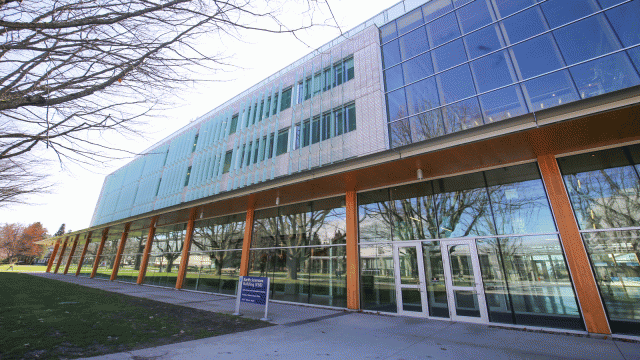Geophysics is an interdisciplinary physical science of the planets and their environments, in particular the Earth. Geophysics applies the knowledge and techniques of physics, mathematics, and chemistry to understand planetary structure, dynamic behaviour, and evolution through time.
Why this program?
- Get an in-depth background in geophysics and computational and data analysis.
- Study at one of the world’s top-ranked universities in environmental sciences.
- UBC houses the Geophysical Inversion Facility, which carries out research on geophysical inverse theory.
- UBC has strong connections with many of the 1,200 mineral exploration companies based in BC.
Program information
Send details- Campus: Vancouver
- Faculty: Faculty of Science
- Degree: Bachelor of Science
- Length 4 yrs
-
Co-op
Yes
You can combine your studies with full-time, paid work at top local and international organizations.
-
Honours
Yes
You can study intense specialization in a single field.
Geophysics is an interdisciplinary physical science that applies the knowledge and techniques of physics, mathematics, and chemistry to understanding the structure, subsurface, and dynamic behaviour of the earth and its environment. Science electives are normally selected from Geophysics, Mathematics, Physics, Geology, Astronomy, Oceanography, and Chemistry courses. An honours program in Geophysics is suited to students seeking to do research in the field.
As Geophysicists typically work in teams, this specialization helps prepare you for future employment through seminars and student projects designed to help you perfect your communication skills and ability to work in groups.
Campus features
UBC is home to the Mineral Deposit Research Unit (MDRU), a geological and geophysical research program at UBC that helps train students for employment in the mineral exploration industry, and the Geophysical Inversion Facility (GIF), which is concerned with the development and application of geophysical forward modelling and inversion methodologies. The Pacific Museum of the Earth is open to students.
Complicated and intricate visualization of the Earth’s interior is an important element of the geophysicist’s job. You’ll have access to the Earth Science Building’s state-of-the-art computing and imaging technologies as part of their geophysical labs.
Send detailsLife at UBC's Vancouver campus
Built in 2012 to LEED Gold construction standards, the Earth Sciences building is home to the Department of Earth, Ocean, and Atmospheric Sciences. It houses the department’s cluster computers for numerical weather and climate simulations, weather-instrument platform for research and teaching, modern labs for oceanographic research, wet labs, and two computer lab classrooms for undergraduate student use.
Find out moreYour future
The Geophysics specialization qualifies graduates for work in a wide range of earth sciences disciplines. The program equips you with strong critical thinking, analytical problem solving, communication, statistical, computational and research skills, and the ability to work effectively in teams. These skills are highly sought after and are transferable to many workplaces.
The specialization can be tailored to qualify you for registration as a Professional Geoscientist (P.Geo.) with the Association of Professional Geoscientists of British Columbia (APEGBC).
Program graduates
- Geophysicist-in-training, DMT Geosciences
- Principal geophysicist, Teck Resources Limited
- Offshore field geophysicist, Schlumberger
- Principal geophysicist, Mira Geoscience
- MSc candidate in Geophysics, California Institute of Technology
- Geophysicist, HDR
Program requirements
English-language requirements
English is the language of instruction at UBC. All prospective students must demonstrate English-language competency prior to admission. There are numerous ways to meet the English Language Admission Standard.
General admission requirements
IB Diploma Programme
- Completed IB Diploma, including at least three Higher Level courses.
IB Certificate Courses
- IB Certificate courses (Standard and Higher Level) may be used in an admissions average if you are graduating from a recognized high school curriculum that can be used as your basis of admission.
- IB Math Applications and Interpretations SL, or IB Math Studies, do not satisfy the math requirement for admission to UBC’s science-based programs, the Faculty of Management, the UBC Sauder School of Business, or the Vancouver School of Economics.
Degree-specific requirements: Science
- IB Math Analysis and Approaches SL or HL, or IB Math Applications and Interpretations HL (IB Math Applications and Interpretations SL, or IB Math Studies, are not acceptable)
- One of IB Biology, IB Chemistry, or IB Physics
- Grade 11 or equivalent Chemistry, and
- Grade 11 or equivalent Physics (may be waived with grades of 5 in IB Chemistry and in your IB Mathematics course)
Note: Grade 11 Chemistry and Physics requirements listed are only relevant to students who are not completing the equivalent IB Diploma Chemistry and/or Physics courses.
For students studying outside of Canada, some examples of courses that may be accepted as Grade 11 equivalents are junior-level courses for American students, and IGCSE and O Level for those following British-patterned curricula.
Related courses
The following subject categories are particularly relevant for this degree. Consider taking courses in these areas in your junior year and senior year.
- Language Arts
- Mathematics and Computation
- Sciences
